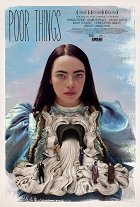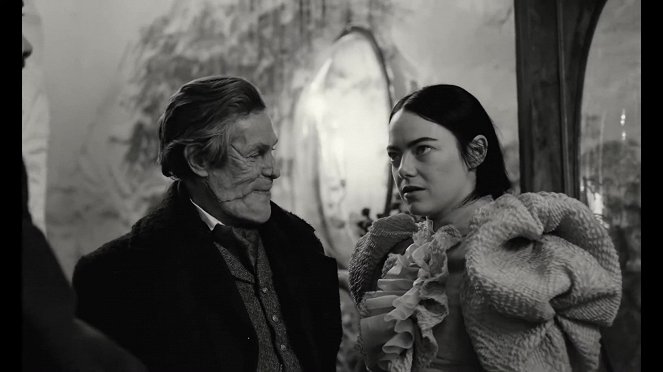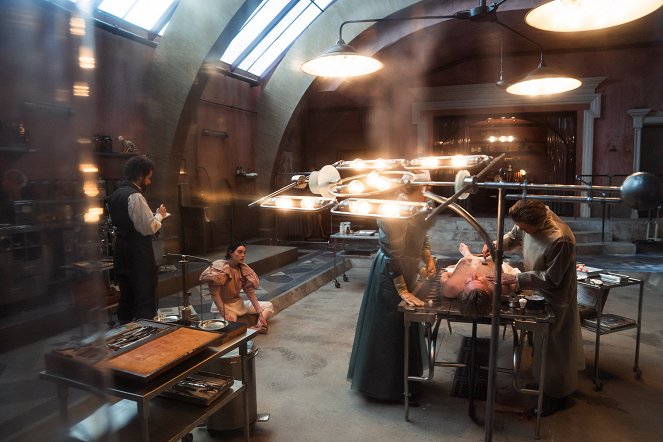Directed by:
Yorgos LanthimosScreenplay:
Tony McNamaraCinematography:
Robbie RyanComposer:
Jerskin FendrixCast:
Emma Stone, Mark Ruffalo, Willem Dafoe, Ramy Youssef, Christopher Abbott, Jerrod Carmichael, Hanna Schygulla, Margaret Qualley, Vicki Pepperdine (more)VOD (4)
Plots(1)
From filmmaker Yorgos Lanthimos and producer Emma Stone comes the incredible tale and fantastical evolution of Bella Baxter, a young woman brought back to life by the brilliant and unorthodox scientist Dr. Godwin Baxter (Willem Dafoe). Under Baxter’s protection, Bella is eager to learn. Hungry for the worldliness she is lacking, Bella runs off with Duncan Wedderburn (Mark Ruffalo), a slick and debauched lawyer, on a whirlwind adventure across the continents. Free from the prejudices of her times, Bella grows steadfast in her purpose to stand for equality and liberation. (Searchlight Pictures US)
(more)Videos (13)
Reviews (12)
It has been a long time since a performance has captivated me as much as Emma Stone's here. I was cautious, because Yorgos Lanthimos's The Favourite didn't impress me as much as the rest of the world five years ago, and yet at least on the surface it seemed like a relatively normal film. Poor Things isn’t like that, it was immensely enjoyable from the opening scene. Victorian surrealism, strange scenes alternating with stranger ones, and gradually everything starts to make sense, but you still have no idea where it's going. I'm sure the film is brimming with all sorts of psychological and philosophical meanings; double, triple and multiple meanings that can be gradually revealed, but aren't necessary. It can stand without them and conveys its message easily to everyone, however bizarre the story and its protagonists are.
()
The current hit by Yorgos Lanthimos, nominated for an extraordinary number of awards, is based on Alasdair Gray's book "Poor Things: Episodes from the Early Life of Archibald McCandless M.D., Scottish Public Health Officer" (1992). Gray is often compared to James Joyce, and that is why it is so easy to succumb to the impression of Lanthimos' genius, whose contribution, however, lies only in the combination of Gray's pseudo-Victorian novel with Frankenhooker (1990) by Frank Henenlotter. I perceive many other references, whether it's Freaks or Elephant Man, but the whole is an exceptionally charming pastiche. There is no need to elaborate on the magical performances of Emma Stone, Mark Ruffalo, Willem Dafoe, Hanna Schygulla, and Margaret Qualley because it must have been a joy to work on such a creative film. Mary Shelley would surely be thrilled.
()
Poor Things is a tremendously charming and wildly playful cinematic bildungsroman that demolishes gender roles and patriarchal fallacies with unbridled childlike verve, while grandiosely revealing their absurdity. Whereas Barbie was built on a shared sisterly sigh with a smile and remained in the realm of consumerist conformity while glorifying plastic kitsch, Poor Things offers up a lavish and iconoclastic riot grrrl pamphlet with a likable pout. Bella Baxter is a captivating, monstrous role model. Her journey through the world inevitably leads to her coming of age, but not in the sense of abandoning immediacy and committing herself to accepting the lot in life that others have laid out for her. Bella gets to know the world with its painful paradoxes, but she does not let herself be constrained by those around her and can conversely build places of personal freedom within herself and in her immediate surroundings amid all of the social nonsense. The film incorporates all of this into a sort of Art Nouveau ornament that is simultaneously delightfully beautiful and unavoidably bittersweet, as the steampunk stylisation and grotesque derangement constantly highlight its fantastical and thus unrealistic essence.
()
Yorgos Lanthimos’s greatest hits (coloured and expressively remixed). At its core, Poor Things is Dogtooth part II with the layout of an emancipation drama. Here we have a similar constellation – father-creator, who tries to protect a woman-child from the dangers of the world and foster in her a pure being, which makes him a god and a tyrant. Here we have a heroine who moves strangely, which reflects the twisted nature of the world and the attempt to free herself from conventions that others have imposed on her. Where Dogtooth ended, however, Poor Things begins. Bella and her journey of initiation through the world are reminiscent of a sexual and social bildungsroman with several stops along the way to discovering that her body belongs to her and her alone. This is a realisation that the heroes and heroines of Lanthimos’s previous films came to only painfully and with difficulty, usually ending in an embarrassing misunderstanding. The clumsy rebellion against convention, the arbitrariness of social rituals, the ego of men who try to remake women in their own image – in Poor Things, these Lanthimos trademarks are made more digestible because the film externalises them and caricatures them to an even greater extent. Nevertheless, it doesn’t sacrifice a certain amount of unpleasantness and the ability to put the viewer on the edge of their seat. I would place Bella and her escapades in schools instead of sex-education classes. Everything essential is there. Unfortunately, I only half believe Yorgos’s inner Zeman/Jeunet. I have always seen him as a brutalist and cinematographer Robbie Ryan as a realist. I find their pastel colouring books to be borderline kitschy – “attract with originality” recklessly overlaps with “make faces in every close-up”. Lanthimos’s originality has always consisted not in any spectacularly eccentric outward presentation, but in creating a picturesque initial situation, twisted realism and working with actors as if they were living marionettes. Of course, the actors are magnificent; I would point out the wonderful cameo by Hanna Schygulla in the role of an old woman who doesn’t shy away from talking about her sexuality. We can interpret Poor Things in various ways and probably every interpretation will have its own vague truth. Personally, I interpret the film as a metaphor for Lanthimos’s work, which began with warped and manipulative experiments on human material in an ugly laboratory and grew into comprehensible and mainstream catharsis in colourful settings. In my heart and soul, I will always have a greater affinity for his older, scarred dystopian freakshows about people dragged along by conventions than for his pathological fairy tales about poor wretches who have become masters of their own bodies and fate.
()
The Daughter of Frankenstein and her emancipatory odyssey across Europe and the Mediterranean. Once again, Yorgos Lanthimos presents us with a fragment from a twisted fantasy world, but one that bears more parallels to our own than one might first expect. The story focuses on the development of the character Bella, who is brought back to life after death by a peculiar scientist, whereupon, with the brain of a child, she learns about the world and gradually develops in all directions, even those that could be described as taboo. Emma Stone gives a masterful performance, and her character packs on more and more layers as the minutes pass until the triumphant finale. This engaging, visually extravagant and humorous film about the journey of an original protagonists of real-world discovery and gradual emancipation will definitely not bore you for a moment.
()



Ads